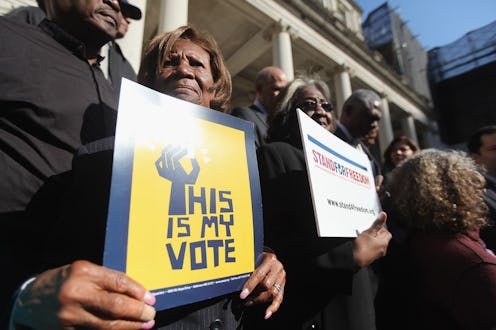News
New Voter Suppression Tactic Threatens Minorities
Forget the voter ID requirement. Imagine showing up to your polling place only to find that you are no longer registered because an election official found it suspicious that someone else in another state has your same name. According to a six-month investigation by Al Jazeera America, millions of voters — a disproportionate number of whom are voters of color — could be purged from the rolls in 27 states as election officials rely on flawed methodology to aggressively scrutinize voter lists.
Relying on the controversial Crosscheck program, a group of mostly Republican election officials have compiled a list of some 6.9 million voters they suspect are registered in multiple states and potentially voted twice. These voters could now be challenged and removed from the rolls without their knowledge. But as Al Jazeera’s Greg Palast found, the program used to compile the fraudulent voters is incredibly imprecise and predisposed to challenge minority voters.
Already, election officials in Virginia have voided the voter registrations of some 41,637 people. There is no evidence as to how many of those voters were guilty of double voting or even of being registered in two states. And without more public attention and oversight, that number could skyrocket.
So how did officials put together this problematic list of (disproportionately minority) voters? It all comes back to Interstate Crosscheck, a program championed by Kansas Secretary of State Kris Kobach (R) who has made a name by supporting tight restrictions on ballot access. Through Crosscheck, states can compare their voting rolls to those of other states in order to weed out double registrations. Seems simple and uncontroversial, right?
Except that the Interstate Crosscheck does not conduct a rigorous, good-faith assessment of potential duplications. It doesn’t take into account middle names or the presence of any Sr. or Jr. Nor does it attempt to match birth dates and Social Security numbers. Which means that as long as your first and last name is similar to that of someone else in another state, you could easily be identified as a problem voter and be proposed for purging. (A list analytic specialist that Al Jazeera consulted called the approach “ludicrous, just crazy.”)
To give you a sense of how frequently people with similar names come up: There are 86,020 John Jacksons in the United States, according to one people search website. And owing to a number of culturally specific factors, members of minority groups are more likely to share their first and surnames than the white population as a whole. In fact, just 30 last names can account for a sixth of the entire Asian-American population.
This brings us to the most troubling aspect of the threatened voter purges: People of color are more likely to end up on these Crosscheck lists than their white counterparts. According to Al Jazeera, blacks are 45 percent over-represented as a proportion of the population on the Crosscheck lists. Asians are 31 percent over-represented, and Latinos are not far behind at 24 percent. In comparison, white voters are 8 percent under-represented.
Yet even with dedicated resources and personnel at their disposal, election officials are having a hard time finding cases in which people have actually voted twice in the same election. Although Kobach bragged about uncovering 14 cases in Kansas, so far there have been no convictions. In North Carolina, where a Republican-led General Assembly has led a full-frontal attack on ballot access, the former FBI agent hired to investigate this kind of voter fraud has not found one instance of a double vote since starting his job five months ago.
This story is pivotal. Taken together with GOP voter ID laws, cuts to early voting, the elimination of same-day registration, and the restrictions on provisional ballots, it is hard to see this manhunt for double voters as anything but a deliberate and conscious strategy to shore up a white Republican voting bloc that is racing against demographic shifts.
As Slate’s Jamelle Bouie puts it:
Whether Republican officials are trying to nudge the electorate in the GOP’s favor is almost beside the point—since, intentions aside, that’s what’s happened. And when you take this out of its isolation chamber and put it in context—a world where Republicans want voter identification and reduced early voting and stiffer registration laws—it looks like a pattern of deliberate suppression.
The midterm elections are on Tuesday, and losing thousands of minority voters is a serious threat to the outcome and the integrity of our elections. And so now the question is: How much more evidence do we need before we can start calling a spade a spade?
Images: Getty Images (2)
